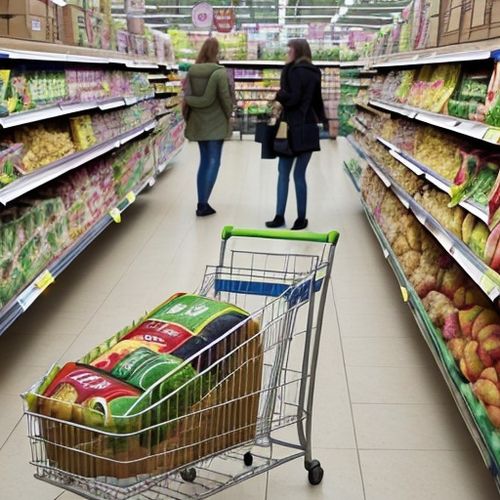For bargain hunters across Europe, timing can be everything when it comes to snagging the best supermarket deals. While many shoppers assume weekends offer the widest selection of discounted items, a growing number of savvy consumers swear by Wednesday evenings as the golden hour for grocery savings. This unexpected timing reveals fascinating insights into how European supermarkets manage their inventory and pricing strategies throughout the week.
The midweek discount phenomenon stems from several operational realities in the grocery industry. Most European supermarkets receive fresh produce deliveries early in the week, typically Monday or Tuesday. By Wednesday evening, stores need to clear shelf space for upcoming weekend stock while still maintaining freshness standards. This creates perfect conditions for managers to authorize deeper markdowns on perishable items approaching their sell-by dates. Unlike the crowded weekend shopping rush, Wednesday evenings also see lighter foot traffic, allowing stores to test more aggressive discounting without causing chaos at the checkout lanes.
Seasoned supermarket employees confirm that Wednesday markdowns often go unnoticed by the majority of shoppers. "We start reducing prices after the afternoon rush dies down," explains a department manager at a French hypermarket. "The discounts might look similar to weekend specials, but you're getting first pick of quality items rather than leftovers. Come Saturday morning, those same products would either be sold out or past their prime." This insider knowledge gives Wednesday evening shoppers access to premium discounts on everything from organic vegetables to artisan cheeses that would normally command premium prices.
The discount patterns vary significantly between countries and even between supermarket chains. British retailers tend to begin their midweek price reductions later in the evening compared to their German counterparts. Southern European supermarkets often extend their Wednesday discounts into Thursday morning to accommodate different shopping cultures. What remains consistent across borders is the strategic timing - just far enough from weekend promotions to avoid cannibalizing regular sales, but close enough to the end of the week to effectively manage inventory.
Consumer behavior specialists note that Wednesday evening shopping attracts a distinct demographic. These tend to be working professionals who plan meals strategically rather than stocking up impulsively. They're more likely to incorporate discounted items into planned recipes rather than making bulk purchases that might go to waste. This creates an interesting dynamic where both supermarkets and shoppers benefit - stores reduce food waste while customers enjoy restaurant-quality ingredients at bargain prices.
Interestingly, the Wednesday discount trend has begun influencing other retail sectors across Europe. Pharmacies, bakeries and even some clothing stores have adopted similar midweek promotion strategies to capitalize on changing consumer patterns. Some urban areas now see Wednesday evening as the new "shopping night," with retailers coordinating their discounts and staying open later to accommodate bargain hunters. This shift represents a fundamental change in European retail rhythms that dates back decades.
The environmental impact of this shopping strategy shouldn't be overlooked. By purchasing items that would otherwise risk being discarded, Wednesday evening shoppers contribute significantly to reducing supermarket food waste. Several sustainability organizations have begun promoting "midweek shopping challenges" to raise awareness about how simple timing choices can make grocery habits more eco-friendly. When thousands of shoppers shift even a portion of their purchasing to Wednesday evenings, the collective reduction in food waste becomes substantial.
Of course, the Wednesday advantage comes with some caveats. Not all product categories follow the same discount patterns - while fresh foods see dramatic midweek price drops, shelf-stable items often maintain consistent pricing. The best deals also require flexibility in meal planning, as availability varies week to week. Savvy shoppers recommend keeping a mental list of versatile recipes that can adapt to whatever surprises the discount racks might offer.
As European consumers become increasingly price-conscious and environmentally aware, the Wednesday evening grocery run has evolved from insider secret to mainstream strategy. Supermarkets have taken notice, with some chains now officially promoting midweek specials rather than treating them as unadvertised inventory management tools. This transparency benefits both businesses and customers, creating a more efficient system that reduces waste while putting quality food within budget reach. The next time you walk past a supermarket on Wednesday evening, those flashing discount tags might just be calling your name.

By Rebecca Stewart/Apr 25, 2025

By James Moore/Apr 25, 2025

By William Miller/Apr 25, 2025

By Samuel Cooper/Apr 25, 2025

By Rebecca Stewart/Apr 25, 2025

By James Moore/Apr 25, 2025

By David Anderson/Apr 25, 2025

By James Moore/Apr 25, 2025

By Eric Ward/Apr 25, 2025

By Olivia Reed/Apr 10, 2025

By Ryan Martin/Apr 7, 2025

By Sarah Davis/Apr 7, 2025

By Natalie Campbell/Apr 7, 2025